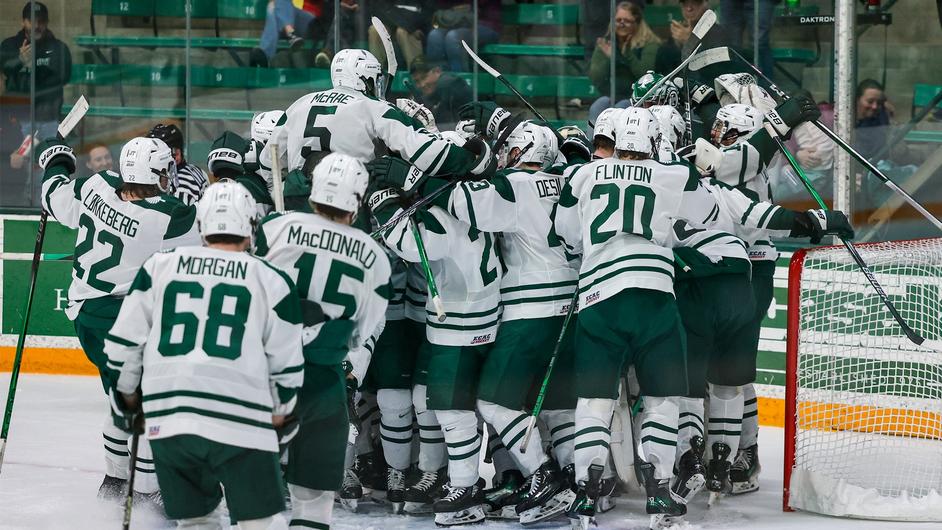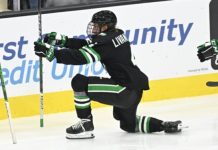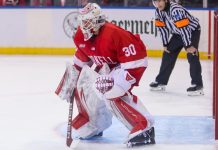
The 2023-24 season’s long and winding road reaches its final exit ramp this week when ECAC Hockey invades the northern reaches of New York’s Essex County for its postseason championship weekend in Lake Placid.
Nicknamed the “Olympic Town,” the host of the 1932 Winter Olympics host village became the third repeat host of the cold weather games when it brought the 1980 games to the idyllic Adirondack region. Once the final home of the pre-World War II era games, it’s now remembered for the Cold War’s “Miracle on Ice” that saw the United States national hockey team upset the Soviet Union’s Red Army machine en route to its second-ever gold medal.
The aftermath of those games saw the United States hockey culture descend on the region, and after college hockey hosted its Olympic-year championship tournaments in 1984 and 1988 at the venue, the ECAC settled its conference championship into the region following a schism that eventually gave Boston Garden to Hockey East after a two-year stint sharing the building.
For the next decade, ECAC crowned its postseason champion on the same ice as Mike Eruzione’s blue-line goal, and after a decade spent in both Albany, New York and Atlantic City, New Jersey, the conference moved back to Lake Placid to continue a tradition of crowning its champion.
“Lake Placid is a special place for American hockey,” said commissioner Doug Christiansen in a statement. “This year marks the 20th ECAC men’s hockey championship in Lake Placid. The city offers something for everyone and the games showcase some of the best teams in the country vying for their chance to win a championship and earn a berth in the NCAA tournament. I am thrilled to work with ORDA and ROOST to continue to make Lake Placid the home of the ECAC men’s championship.”
The current era of trending conference championship weekends to on-campus ice arenas won’t hit ECAC until at least the 2027 season after Christensen and the league office extended its Lake Placid contract through the 2026 postseason, and the ongoing conversation likely won’t disappear as leagues other than Hockey East find their way to the glittery buildings now dotting the college hockey landscape. None of that, though, matters this weekend when four teams with postseason dreams descend on a town known for producing miracles.
Here’s a look at what we can expect this weekend when ECAC crowns its Whitelaw Cup to its 2024 postseason champion:
Championship Weekend Schedule
Friday, March 22 and Saturday, March 23
Semifinal 1: No. 1 Quinnipiac vs. No. 7 St. Lawrence, 4 p.m.
Semifinal 2: No. 2 Cornell vs. No. 4 Dartmouth, 7 p.m.
ECAC Championship: March 23, 5 p.m.
Housekeeping Notes
-Princeton announced that head coach Ron Fogarty will not return as head coach next year after 10 years in New Jersey. A tenure that began in 2014 after a highly-successful run at Adrian College produced the Tigers’ third-ever conference championship and first Whitelaw Cup in a decade when the No. 7 seed cut through the top three seeds en route to a four-round, undefeated run. One of the oldest programs in college hockey, the next head coach will be the 18th in Princeton hockey history dating back to a coachless era at the start of the 20th century.
-Excluding the 2021 championship won when St. Lawrence defeated Quinnipiac during the four-team COVID year, Cornell head coach Mike Schafer has more games coached in the ECAC Championship Game than the number of semifinal or championship game appearances combined by the other three coaches.
-Including the 2021 year, Brent Brekke is one of seven coaches to win their only appearance in the conference championship game. When Reid Cashman coaches Dartmouth in the semifinal round, the list of coaches who have not coached in at least the penultimate round are all recent hirees: Colgate’s Mike Harder (this year), Union’s Josh Hauge (last year), RPI’s Dave Smith (hired in 2017-2018), and whichever coach is hired by Princeton, if it’s not from an existing list.
Previewing the Semifinalists
No. 1 Quinnipiac
How we got here: The regular season champions made quick work of Rensselaer in the quarterfinal with a pair of five-goal outbursts (5-1, 5-2). Andon Cerbone had five points, including three goals, on the weekend, and Anthony Cipollone, Jacob Quillan and Collin Graf chipped in two goals apiece with Quillan adding an additional four assists to pass his teammate for the team’s leading scorer in the sweep.
Last Appearance/Championship: Quinnipiac’s trip to the semifinals last year was its second consecutive appearance in Lake Placid after the team hosted the 2021 championship. The No. 3 seed in the conference had its postseason canceled along with the rest of the world in 2020, but it’s important to note that the Bobcats hadn’t appeared in the conference’s final weekend since a trip to the 2017 semifinals. For all of their impressive performances, they haven’t won a championship since 2016.
Why Quinnipiac Wins It: No team should ever have to shoulder any past year’s burden, but Quinnipiac’s well-documented struggles at winning the ECAC championship face a weaker field than last year’s four-team bid to the NCAA Tournament. The Bobcats have front-run the league for two consecutive seasons, but they’re likely to enter the tournament as a No. 3 seed if they don’t win the championship.
That feels antithetical to Rand Pecknold’s overall coachthink strategy of gaining last change as the better, higher-seeded team. Quinnipiac is a lock to make the tournament regardless of what happens in Lake Placid, but a loss to St. Lawrence would knock the Bobcats to a No. 3 seed. The team’s overall success and firepower should therefore give them enough to hoist their first conference trophy in eight years with an eyeball towards a regional appearance in either Providence or Springfield.
No. 2 Cornell
How we got here: The Big Red swept archrival Harvard in the quarterfinal after earning a first round bye, but the 4-3 and 4-1 results felt both closer and more dominant than the scores indicated after the first game started with a 4-0 lead and the second game remained a one-goal game into the final minute of play.
Last Appearance/Championship: Cornell is one of the conference’s steadiest teams when it comes to advancing to the semifinals, and 2024 is the team’s sixth appearance since the championship relocated to Lake Placid. The three-time Cleary Cup champions before the COVID-19 pandemic haven’t won a Whitelaw Cup since 2010, and the 14-year drought is the longest silverware gap since the first conference tournament championship in 1967 – albeit the two-year gap for the pandemic ostensibly would have ended that drought when the Big Red were ranked No. 1 in 2020.
Why Cornell Wins It: Goaltending, goaltending, goaltending.
Ian Shane’s numbers dwarf anyone who comes within a fraction of passing him. His 1.68 goals against average is one-third better than the next-best goalie in the nation, and his .921 save percentage is easily clear of Vinny Duplessis, Ben Kraws and Cooper Black. That he plays behind one of the league’s most stout defenses isn’t a surprise, but it’s absurd to think that Cornell has the best team defensive numbers in the country when the penalty kill is 35th in the nation and below 80 percent.
None of Cornell’s top scorers aside from Gabriel Seger are in the league’s top-20 goal scorers, but the Big Red are a deep team with a number of players who can kill an opponent with depth. It would’ve been nice to see if they’d gain more position points in the Pairwise Rankings with the six extra games of the non-Ivy League teams, but the fact that Cornell isn’t a lock for the tournament is an extra bit of energy that could lift this team into the championship and beyond for a league that’s otherwise a one-bid conference.
No. 4 Dartmouth
How we got here: Dartmouth’s first bye in 11 years produced a fun two-game sweep over sixth-seeded Union after the Big Green did what they do best: come from behind. The Garnet Chargers had three different one-goal leads over the course of the weekend, but second and third period rallies by Dartmouth’s top-end scoring drove the team to Lake Placid for the first time in decades.
Last Appearance/Championship: It’s been eight years since seventh-seeded Dartmouth advanced to the semifinals before losing to Quinnipiac, but it’s been even longer – 13 years, in fact – since the Big Green ended their conference championship weekend trip with a win…in the long-forgotten Third Place game against Colgate.
There have been other trips to the final four, but Dartmouth hasn’t appeared in the championship game since George Crowe’s Big Green played Dick Bertrand’s Cornell Big Red at the Boston Garden in 1980 – when the ECAC still had three divisions. I’m about to turn 39 years old this year, and even that was five years before I was born. That was also Dartmouth’s last trip to the NCAA Tournament.
Why Dartmouth Wins It: Dartmouth doesn’t know how to lose. The Big Green are absurdly tenacious, and the regular season situational numbers backed up their ability to tie teams in knots. They were undefeated when scoring first during the regular season with a 10-0-3 record ahead of the Union series, but even winning one game when not scoring first was easily overlooked compared to their six ties when opponents scored first. Similar numbers emerged when tied or leading after two periods in the regular season when they went 11-1-7 with a 10-0-1 mark when leading into the third, and of their 11 overtime games, they might have only won one, but they also only lost one.
Dartmouth legitimately doesn’t know how to lose, but the question that remains is if the Big Green know how to beat teams on neutral ice. This is uncharted waters for a team that hasn’t been to the big moment, but the rebuilt depth chart offers one of the best forwards in Luke Haymes, one of the best defenseman in CJ Foley, and a goalie in Cooper Black who is capable of matching some of the league’s best.
Maybe this isn’t a good answer for why Dartmouth wins it, but I’d rather ask a better question: why not? That seems to be one that’s never been answered all season long.
No. 7 St. Lawrence
How we got here: The lone team to advance out of the first round swept Colgate on the road in the quarterfinals with a pair of one-goal games after Game One went to double-overtime. In the second game, a Jan Olenginski goal near the halfway point of the third period was the difference maker for the team that previously eliminated Yale with a 4-2 win at home.
Last Appearance/Championship: It all depends on your perspective. St. Lawrence won the conference championship tournament in 2021 after beating Colgate and Quinnipiac, but the three-team tournament was the last vestige of a four-team season played throughout the pandemic. The Saints never went to the NCAA Tournament after being forced to decline the league’s autobid due to positive COVID cases, but we can’t just omit a championship for the conference’s original champion.
If we look past the 2021 title, St. Lawrence hasn’t won a championship or appeared in the final game since its consecutive crowns at the start of the century, though the team did appear in the 2016 semifinals after winning two overtime games against Clarkson. Three other trips occurred in the interim between the championship and that last ride to Lake Placid, and that 2000 championship under Joe Marsh preceded the Saints’ last run to the Frozen Four.
Why SLU Wins It: Brent Brekke’s team feels a bit like a team of destiny after it swept through Colgate. The double-overtime game specifically occurred after SLU blew a two-goal lead, and the Saints had to rally from a 1-0 deficit and a blown one-goal lead to win the second game at Class of 1965 Arena. There’s also the 3-1 win over Quinnipiac from early February that still sticks out at its semifinal opponent.
Every semifinal team has a legitimately superstar, but St. Lawrence is a team capable of winning through its depth chart. Nine different skaters have five goals this year, and 13 different skaters put five-plus assists on their sticks. Special teams weren’t exactly a source of massive strength, but the penalty kill is about the same as Cornell with a power play that hung around the 20 percent rate.
This year’s league has been particularly wide open, and a win over the Bobcats would drop Quinnipiac to a lower No. 3 seed or even a No. 4 seed by the start of the bracket. Given the potential cut-lines that face the Pairwise Ranking, SLU would effectively knock the lowest-seeded teams out of the tournament and head into a matchup with Boston College as a conference champion. Color me intrigued.
The Lerchies
I started writing for USCHO.com when I was in my mid-20s, but covering Atlantic Hockey with Chris Lerch remains a treasured memory. I loved seeing how we’d play off one another, and I especially enjoyed when I’d have the end-of-season awards that he couldn’t stop me from naming after him. I looked forward to a text calling me out for it, but since he couldn’t stop me, it was my favorite time to let my inner crazy out.
Chris can’t really stop me from doing anything in the ECAC space, so when I left Atlantic Hockey, I took the postseason award “Lerchies” with me. I’m pretty sure he’s never worked a day of his life in ECAC, but it doesn’t matter. Our postseason awards are still named after him.
First Team
F: Collin Graf, Quinnipiac
F: Luke Haymes, Dartmouth
F: Gabriel Seger, Cornell
D: John Prokop, Union
D: Trey Taylor, Clarkson
G: Ian Shane, Cornell
Second Team:
F: Jacob Quillan, Quinnipiac
F: Sam Lipkin, Quinnipiac
F: Liam Robertson, Union
D: Jayden Lee, Quinnipiac
D: Tommy Bergsland, Colgate
G: Cooper Black, Dartmouth
Third Team:
F: Dalton Bancroft, Cornell
F: Cooper Flinton, Dartmouth
F: Chaz Smedsrud, Union
D: Alex Pineau, Brown
D: Nick Strom, RPI
G: Jack Stark, Yale
All-Rookie:
F: Jake Schneider, Colgate
F: Jonathan Castagna, Cornell
F: Mason Marcellus, Quinnipiac
D: Ben Robertson, Cornell
D: CJ Foley, Dartmouth
G: Jack Stark, Yale
Player of the Year: Ian Shane, Cornell
Defenseman of the Year: John Prokop, Union
Goalie of the Year: Ian Shane, Cornell
Rookie of the Year: CJ Foley, Dartmouth
Coach of the Year: Reid Cashman, Dartmouth
The Last Word…
Making it to the end of the season always gives me pause over the journey we’re concluding, and I’d like to offer a few customary final words on this season. A special thank you to everyone who read our pages this year, and specific thank you to the coaches, players and communications folks who tolerated me and worked with me over the course of an entire season. I appreciate the time and energy that makes this machine push forward, and you’re all a big component of that momentum.
I won’t be attending the Frozen Four this year because the Saturday of the national championship is my older daughter’s third birthday, but I sincerely want to mention how much they’ve meant to everything I’ve done this season. Anyone with kids knows how your children give you a purpose beyond yourself, but my two kids are developing into some incredible and amazing human beings. Being their dad is the greatest gift of a lifetime, and my favorite game is always the one that gives me an opportunity to share a moment of pure joy with them.
As the season ends, I’m going back to a world where I’m Mrs. Rubin’s Mr. Rubin. We live in divisive and turbulent times, and I hope this year’s been a reprieve from the strife and tragedy unfolding on the nightly news. Hug your children and share loving moments with your treasured friends and family members. Take a few minutes for yourself. As always, I hope we can all reconvene in the fall when the new season starts. I look forward to being a part of it.
Enjoy your offseason.
With love,
Your Friendly Neighborhood ECAC Writer


